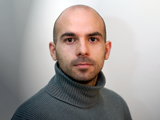IMDEA Networks

PhD Thesis defense: Optimization of Energy Efficiency in Data and Web Hosting Centers

Angelos Chatzipapas, PhD Student, IMDEA Networks Institute and University Carlos III of Madrid
PhD Defense
This thesis tackles the optimization of energy efficiency in data centers in terms of network and server utilization.
For what concerns networking utilization the work focuses on Energy Efficient Ethernet (EEE) – IEEE 802.3az standard – which is the energy-aware alternative to legacy Ethernet, and an important component of current and future green data centers. More specifically the first contribution of this thesis consists in deriving and analytical model of gigabit EEE links with coalescing using M/G/1 queues with sleep and wake-up periods. Packet coalescing has been proposed to save energy by extending the sojourn in the Low Power Idle state of EEE. The model presented in this thesis approximates with a good accuracy both the energy saving and the average packet delay by using a few significant traffic descriptors. While coalescing improves by far the energy efficiency of EEE, it is still far from achieving energy consumption proportional to traffic. Moreover, coalescing can introduce high delays. To this extend, by using sensitivity analysis the thesis evaluates the impact of coalescing timers and buffer sizes, and sheds light on the delay incurred by adopting coalescing schemes. Accordingly, the design and study of a first family of dynamic algorithms, namely measurement-based coalescing control (MBCC), is proposed. MBCC schemes tune the coalescing parameters on-the-fly, according to the instantaneous load and the coalescing delay experienced by the packets.
The thesis also discusses a second family of dynamic algorithms, namely NT-policy coalescing control (NTCC), that adjusts the coalescing parameters based on the sole occurrence of timeouts and buffer fill-ups. Furthermore, the performance of static as well as dynamic coalescing schemes is investigated using real traffic traces. The results reported in this work show that, by relying on run-time delay measurements, simple and practical MBCC adaptive coalescing schemes outperform traditional static and dynamic coalescing while the adoption of NTCC coalescing schemes has practically no advantages with respect to static coalescing when delay guarantees have to be provided. Notably, MBCC schemes double the energy saving benefit of legacy EEE coalescing and allow to control the coalescing delay.
For what concerns server utilization, the thesis presents an exhaustive empirical characterization of the power requirements of multiple components of data center servers. The characterization is the second key contribution of this thesis, and is achieved by devising different experiments to stress server components, taking into account the multiple available CPU frequencies and the presence of multicore servers. The described experiments, allow to measure energy consumption of server components and identify their optimal operational points. The study proves that the curve defining the minimal CPU power utilization, as a function of the load expressed in Active Cycles Per Second, is neither concave nor purely convex. Instead, it definitively shows a superlinear dependence on the load. The results illustrate how to improve the efficiency of network cards and disks. Finally, the accuracy of the model derived from the server components consumption characterization is validated by comparing the real energy consumed by two Hadoop applications – PageRank and WordCount – with the estimation from the model, obtaining errors below 4:1%, on average.
About Angelos Chatzipapas
I am currently doing my PhD at Universidad Carlos III de Madrid and IMDEA Networks Institute on Telematics Engineering. In the past, I have attended the master programs Telematics Engineering (UC3M, Madrid, Spain), Cryptography, Security, Systems and Network (Polytech’ Nice – Sophia Antipolis, France) and Communication Engineering (RWTH-Aachen, Germany). In 2006 I received my BEng in Computer Engineering and Informatics (University of Patras, Greece). I have also worked at Telecom Bretagne (Rennes, France) and INRIA Sophia Antipolis (France).
The thesis defense will be conducted in English
PhD Thesis Advisor: Dr. Vincenzo Mancuso, Research Associate Professor, IMDEA Networks Institute
Tutor: Rubén Cuevas Rumín, Visiting Professor, University Carlos III of Madrid
University: University Carlos III of Madrid
Doctoral Program: Telematics Engineering
More info
- PhD thesis: “Optimization of Energy Efficiency in Data and Web Hosting Centers”
- IMDEA Networks Publications: Theses
- PhD Students at IMDEA Networks
- Alumni Network

